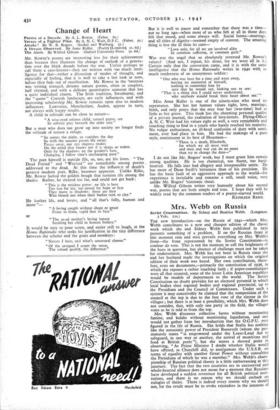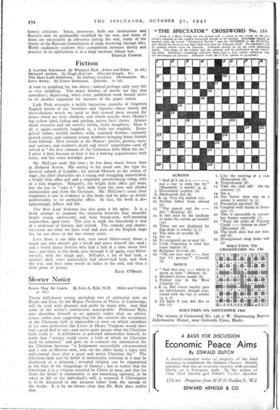Mrs. Webb on Russia
THE new introduction—on the Russia of 1941—which Mrs. Webb contributes to a new and cheaper edition of the classic work which she and Sidney Webb first published in 1935 presents something of a problem. If on the Russian front at this moment rain and mist prevails everything on Mrs. Webb's front—the front represented by the Soviet Constitution—is couleur de rose. This is not the moment to call the brightness of the hues in question, but absence of challenge must not be taken for endorsement. Mrs. Webb has not been in Russia since she and her husband made the investigations on which the original edition of their work was based. Her own contribution, there- fore, rests on documents,—primarily the constitution of 1936, in which she reposes a rather touching faith ; if paper-constitutipns were all that counted, some of the lesser Latin American republics would be models of deportment to the world. The Soviet Constitution no doubt provides for an electoral pyramid in which local bodies elect regional bodies and regional provincial, up to the Presidium and the Council of Commissars. Under such a system it may conceivably be claimed that the composition of the council at the top is due to the free vote of the elector in the villages ; but there is at least a possibility, which Mrs. Webb does not consider, that, with only one party in the field, the villager votes as he is told to from the top.
Mrs. Webb discusses collective farms without mentioning famine, and kulaks without mentioning liquidation, and one would not gather from her introduction that the O.G.P.U. ever figured in the life of Russia. She holds that Stalin has nothing like the autocratic power of President Roosevelt (whom she pre- maturely states " is empowered under the Lease-Lend Act to safeguard, in one way or another, the arrival of munitions and food at British ports "), but she scores a shrewd point in observing, " As Prime Minister I doubt whether Stalin would have offered, as Churchill did, to amalgamate the U.S.S.R. on terms of equality with another Great Power without consulting the Presidium of which he was a member." Mrs. Webb's cham- pionship of Russian political theory is a little embarrassing at thi'4 juncture. The fact that the two countries are in unreserved and whole-hearted alliance does not mean for a moment that Russians have developed a sudden reverence for all British political insti- tutions, and there is no reason why we should embark ,on eulogies of theirs. There is indeed every reason why we should not, for the result must be to evoke rejoinders in the interests of honest criticism. Since, moreover, both our institutions and Russia's may be profoundly modified by the war, and many of them are necessarily in abeyance during the war, study of the theory of the Russian Constitution of 1936, involving (though Mrs. Webb studionsly eschews this) comparison between theory and practice in its application is in a large measure labour lost. FRANCIS GOWER.























 Previous page
Previous page